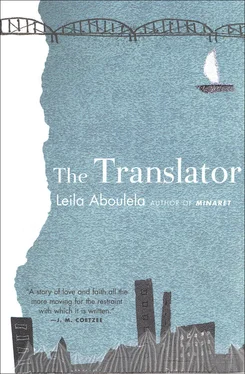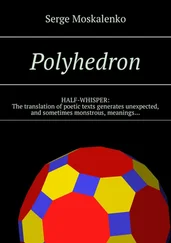The politics of Libya and a lot of sun in the room, hitting the shelf of books, the filing cabinet. There were labels on the filing cabinet: Research, Administration, Teaching. Her work with him came under Research. What she translated made up part of the references for the papers he published in journals, presented in conferences.
‘So you didn’t go to Stirling?’ she said when he finished speaking on the telephone.
‘I’ll go in the afternoon, if the road’s clear.’
She was going to ask him if he would miss the funeral when the telephone rang again. It was a colleague this time, someone he was at ease with because he laughed when he spoke of the hijack, said he was up half the night hearing the news and yes, it was nearly as good as in the seventies but unlikely to compete with Entebbe.
There were pauses when he was listening and she was unaware of what the conversation was about. She could hear the students downstairs playing in the snow. Their laughter came through the window.
A few words from Rae, snatches, ‘We’re having our funding cut again’… ‘I didn’t know about that’… ‘Paris! Lucky man.’
When he finished, he said, ‘I’m sorry,’ and she thought of driving with him to Stirling in the afternoon. They would drive south and there would be snow piled at the side of the road. They would stop for petrol and from the shop he would get her mineral water and sweets. He left his desk and came to sit with her, leaned to kiss her but she moved her head away. His chin brushed against her scarf. They laughed a little, embarrassed now, a nervous laugh like breathing. But in the silence that followed, her resolve was strengthened. She said, ‘I want to ask you something.’
‘Ask me.’ He was more subdued than when he was speaking on the telephone.
‘I want to ask you to become a Muslim so we could…’
Her courage failed her. She could not look at him. She looked down at her gloves on her lap. If it could really happen, she could drive with him to Stirling to be alone with him, to be settled. The words tumbled out, ‘I want to talk to you about this all the time but it’s so hard. We talk of Islam when we talk of work and it’s different from the way I want to talk to you.’ She folded her gloves in her hands, unfolded them again.
When he didn’t say anything, she looked up. If what was in his eyes was wariness, surprise, she would have felt the barriers between them, she would have withdrawn. But what she found was distress, enough to twist her with pity for him. Why, when she wanted to make him feel safe, when she wanted to look after him?
‘Is the shahadah what you want to talk to me about?’ His voice normal, the way he spoke to her.
‘Yes.’ She put her gloves back on.
‘Are you cold?’
‘No.’ So much sun was in the room, but the cold was inside her. She had come with it from outside.
‘There’s a portable heater in the cupboard in the hall; I can get it.’
She shook her head, ‘No, I’m alright.’
Somehow it was easier to talk after that, to say what she wanted to say, the way she wanted to say it. It was not difficult, confidence came.
She said, ‘I wanted to talk to you about the shahadah, what it means.’ She breathed in and went on, ‘It’s two things together, both beginning with the words, “I bear witness”. I bear witness, I testify, to something that is intangible, invisible, but I have knowledge of it in my heart. There is no god except Allah, nothing else is worthy of worship. That’s the first thing… Then the second thing… I bear witness that Muhammad is His messenger, a messenger not only to the Arabs who saw him and heard him, but to everyone, in every time.’
She thought, I have to explain things right, I have to be clear. She said, ‘There were messengers before, Moses and Jesus and others. Every messenger comes with proof about himself, a miracle suitable to his time. Something that his people would find deeply impressive, something that would make them listen to him. Though even with these miracles not everyone believes.
‘The Qur’an was the miracle that Muhammad, peace be upon him, was sent with. And it’s different from the miracles of the other Prophets because it’s still with us now… it’s still accessible. For the Arabs who first heard it, it was something new and strange, neither poetry nor prose, something they had never heard before. When the early verses of the Qur’an were recited, many people were crying from the words and how they sounded…’
He said, ‘Translations don’t do it justice. Much is lost…’
‘Yes, the meanings can be translated but not reproduced. And of course the miracle of it can’t be reproduced… But even then, hearing it from the Prophet, peace be upon him, not everyone believed. Not everyone accepted that the source and wording of what they were hearing came from Allah. The first believers were mostly women and slaves. I don’t know why, maybe they had softer hearts, I don’t know…’
‘Maybe in changing they did not have much to lose,’ he said. ‘It was the rulers of Makkah who were reluctant to give up their traditions and established ways for something new.’
She said, ‘They were very bad in Makkah to the early Muslims. Muhammad was known as Al-Amin, that was what everyone called him. It means the honest, the trustworthy, but when he said, “I am a messenger from Allah”, he was called liar, mad-man, poet. These are the doubts that people have… Allah tells us in the Qur’an, reminds us again and again, these verses are not the words of a poet, they are Divine revelation, certain truth.’
She paused and then said, ‘Everything in my religion comes from this. The words of the Qur’an which you told me the seventh-century Pope dismissed as heresy… Now tell me if you believe or not.’

She walked to the window. Flakes of snow drifted down from the roof, talcum powder, icing sugar. She saw the students whose voices she had been hearing. They were in the car park, two boys rolling a huge snowball grey with dirt from the ground. They laughed as they propped it against the door of one of the cars. She felt old looking at them; they were young and did not have many responsibilities. If Rae said no, what exile would he put himself in? If he said no, she would walk out on to the snow, an exile she would take with her wherever she went.
When she turned around he said, ‘I am not sure.’
She had expected yes or no. She would have known what to say if he had said yes. She would have known what to do if he had said no.
She sat down and because she was silent he repeated, ‘I’m not sure.’
She said, ‘Do you know what it means for us?’
‘I know. I’ve always known.’
‘I imagined we could get married today.’ Her voice startled and bruised her, like sandpaper, like sea-salt. ‘Now, and I could go with you to Stirling. I don’t want to go to Egypt.’
‘How could we get married now?’ The same distress in his voice.
‘I thought Fareed could marry us and it would not be difficult to get two witnesses.’ She had imagined students as witnesses. Even with the snow, they could still have found Muslim students. It was not how she had got married to Tarig, but it was how it used to be when people lived by Islam alone. Two witnesses, and a gift. A gift however simple or small. In the Prophet’s time, two chapters of the Qur’an were an acceptable gift from a man who had nothing to give his new wife but verses which he had memorised. Now in Muslim countries, it was gold and dollar bills, endless discussions about who should buy the video set and fridge-freezer.
There was a silence in the room. She thought, why isn’t he saying anything, why isn’t he talking to me? She thought, why am I numb, why am I not crying yet?
Читать дальше













